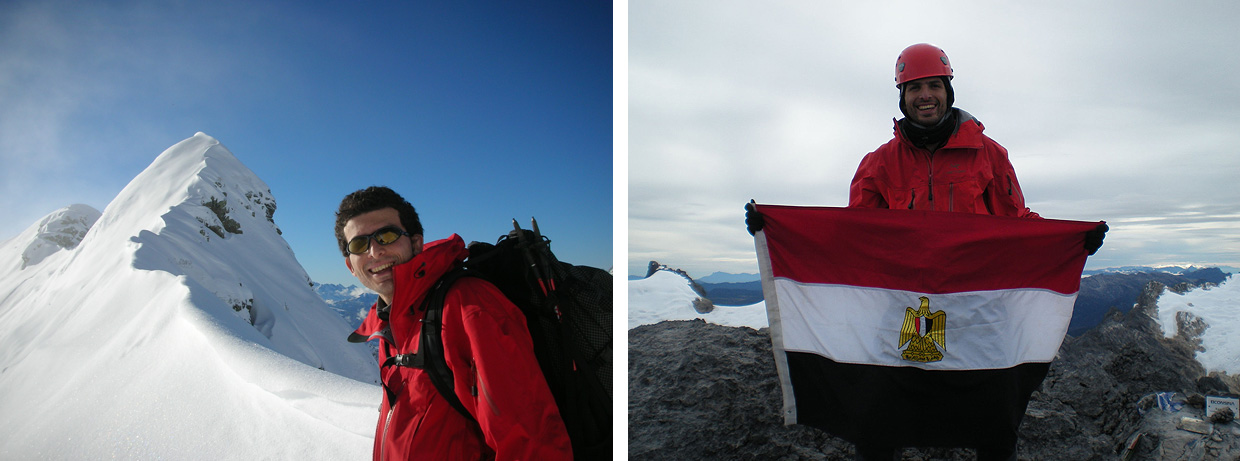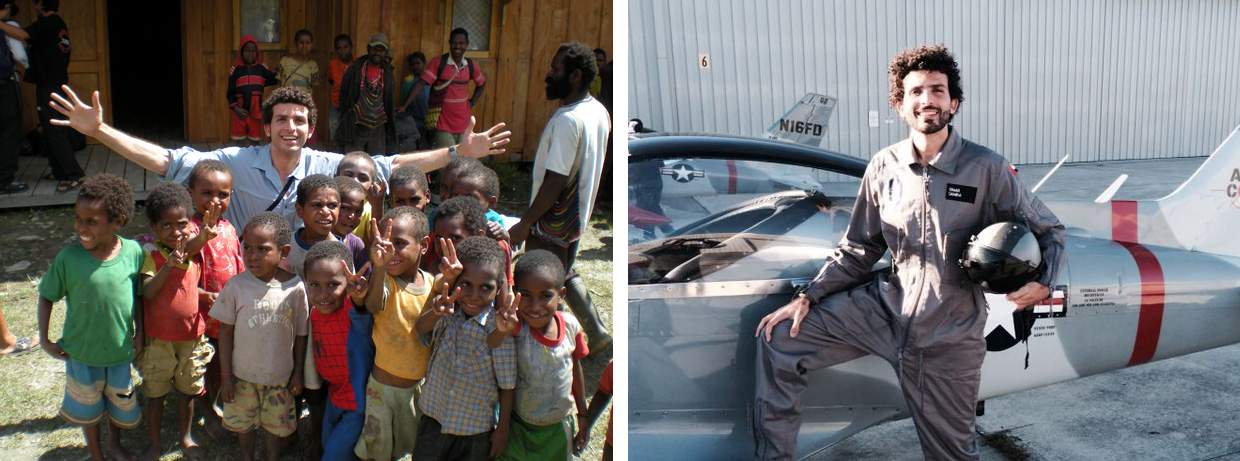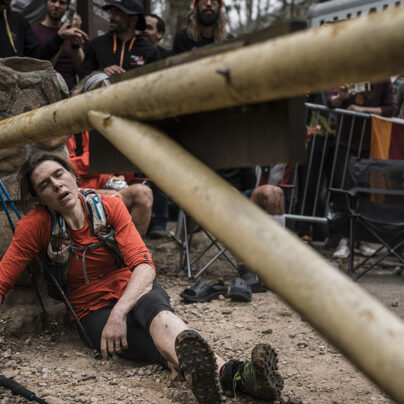For Your Countrymen
An Interview with Omar Samra
Orla O'Muiri
We caught up with Omar to ask him about carbon neutral expeditioning, Type Two fun, his ongoing ‘Adventure Grand Slam’ (the seven highest summits on each continent and the two poles) and why it’s important to attempt what your countrymen have never done before.
Why do you think more Egyptians aren’t trying out the adventure of lifestyle, accomplishing the kind of feats you have?
Here we say Egyptians like to remain close to the banks of the river Nile, and historically speaking we haven’t been much of a voyaging nation. The infamous river provides sustenance and security from an otherwise arid landscape so the logic is why leave when you have what you need here. I think in many ways, us Egyptians had a lot of mental blocks pre-revolution, we didn’t believe in ourselves too much or in our ability to change the cards we’re dealt in life. The events of January 2011 created a shift. We’re more willing to believe in the beauty of our own dreams now and that’s a far more exciting world to grow up in I think.
When I was trying to finance my Everest expedition of 2007, it took me 15 months of countless meetings and presentations to convince someone of the value of an undertaking that celebrates the human spirit and puts the first Egyptian on top. Until days before the expedition, it seemed it would not materialise and months of training and preparation would have been lost. Remember it takes the right one person to believe in you so you have to keep trying until you get there. Funding expeditions still remain excruciatingly hard back home but far more people understand why I do it.
In the last four or five years I can say these changes have become more rapid. For one through my adventure travel company Wild Guanabana, I see far more people interested in travelling differently and exploring their own mental and physical boundaries through venturing into the unknown. We also see far more people looking to alternative methods of fitness focusing on stamina and endurance rather than bulk and strength. To me this just shows that people are curious and they want more out of life. From a travel perspective they want to go out there and sightdo not just sightsee like they used to.
You have given many talks about your travels, what is the main message you are trying to get across?
Using my own personal journey and expeditions, I’m trying to challenge people to think about their life choices differently. In this part of the world, we’re expected to follow a set path and peer pressure plays a big role in where we end up doing or being in life. If I was a scrawny asthmatic kid and climbed Everest then you can achieve whatever you set your mind to is what it comes down to. I want people to take risks, to dream and fight for them. To understand that ‘failure’ is an important part of success and that the right way is usually the longest and hardest. To not listen to those who like to tell them what they can and cannot do. To believe that each one of us has extraordinary abilities that will surprise us if we only just allow it and take that leap of faith.
You dreamed of climbing Everest for several years before you did it. I’m sure many have dreamed the same but never did it. What made you different from all those others? How did you make it a reality?
Since I climbed Everest in 2007 I have been approached by many Egyptians wanting to do the same and I have tried to assist a few with that objective. However, only one or two I met were actually serious and willing to do the hard work necessary for as long necessary to get up there. Many people want to take shortcuts to the top or they become disinterested after a few hurdles. I think what worked for me is realising this was a multi-year plan and if I stood any chance of making it, I had to enjoy every step along the way and not just the few minutes on the summit or the recognition that came with it. Breaking down that one big goal to smaller more achievable ones provided the necessary motivation and encouragement to keep going. Mostly what kept bringing me back to the mountains is my love for nature and discovering myself through pushing my own physical and mental boundaries, which there was quite a few of. I think mainly you have to love what you do vaguely to the point of obsession, otherwise when the going gets really tough, you won’t see the point to carry on.
Why was it important to you to make it the world’s first carbon neutral 7 Summits expedition?
I believe it’s a way to raise awareness about our impact on the environment around us and more specifically in this case, our carbon footprint. There is a lot of simple things we can do to dramatically improve the sustainability of how we live. It’s important to realise that achieving carbon neutrality starts with reduction which is where you adapt your everyday lifestyle to become more environmentally friendly and that’s the most vital part. The next step is offsetting and this is where you calculate the emissions that cannot be reduced and buy equivalent carbon credits from the market. For the 7 Summits expeditions, I worked with an environmental consultancy to accurately calculate the emissions and determine which were the best projects to work with to make these offsets. While I can accept that achieving carbon neutral has its critics, making smart lifestyle choices that reduce our carbon footprint is no longer something we can overlook.
I want people to take risks, to dream and fight for them. To understand that ‘failure’ is an important part of success and that the right way is usually the longest and hardest. To not listen to those who like to tell them what they can and cannot do. To believe that each one of us has extraordinary abilities that will surprise us if we only just allow it and take that leap of faith.

I didn’t know there was a word for that; I think I’ll start using it from now on so thank you! I definitely agree. People ask me if climbing Mount Everest or some of the longer expeditions was fun and I try to be honest and say it was pure agony but then people look at you funny and wonder why on earth you take time so much time off to do it, especially in our part of the world when people go considerably out of their way to avoid discomfort of any kind. The reality is that amidst the pain and suffering there are uber magical moments when it all makes perfect sense. The clarity of mind, feeling of belonging and purpose from being in nature and having committed yourself to an undertaking bigger than yourself far overshadows anything you might experience in your day to day life. So it’s nice to step out to experience that and come back with a new perspective; you just need to commit to injecting those nuggets of insight into your daily life because our busy lives have a habit of making us forget again. It was on a mountain in West Papua that I finally made a decision to escape the drudgery of corporate life and I’ve never looked back. The mountain showed me the way and it’s there to do the same for anyone who embraces it – of course I don’t mean necessarily escaping corporate life, but simply finding their calling.
What have you found is the most challenging/hardest part of the expeditions you’ve done?
Quietening the mind when it’s trying to tell you that you don’t have what it takes to go through with it. That chatter usually manifests itself when things get too damn cold for an Egyptian or when I feel I may have just taken a bigger bite than I can chew, both things seem to happen quite often. When this happens I have learned to calm myself and just break things down to the point when I’m only thinking of putting one foot in front of the other. Can you do just that I’d ask myself and the answer is invariably yes. Eventually I get to where I need to go.
Raising money to do some of the bigger expeditions is also extremely challenging in our part of the world. Even harder is to get sponsorship to do some of the more obscure yet often more interesting expeditions. I’m hopeful that this will improve with time, if not for me then at least for the generations to come, as the adventure culture becomes more understood and accepted in our part of the world.
You are currently aiming to complete the Adventure Grand Slam – how does your polar training and preparation for the south and north pole expeditions differ from your mountain climbing training?
Withstanding the elements is a big part of it. Living between Cairo and Dubai nowadays means I’m never in a place that is remotely native to the climates I encounter on the expeditions that I go on. I also seem to kick up the heater in the Spring back home which my brother continuously makes fun of. I tend to be wimpy about the cold when I’m home and then somehow switch into a different gear when I step out of the plane somewhere substantially subzero. I’m mostly comforted by the fact that it’s all largely mental at the end of the day and my mind will kick in when I need it to. Naturally I suffer all the same.
I intend to head to Norway to get some of the polar specific survival training I need. It will be interesting to put on a pair of skis for the first time! From a purely physical fitness training point of view my training is relatively similar to big mountain training. In Alaska last year and the one before that I was pulling heavy sleds as well as carrying a big pack. At home, I train outdoors doing what is known as HIIT or High Intensity Interval Training which means training in very intense short bursts that dramatically elevate your heart rate followed by far shorter breaks. This helps increase your Vo2 max levels and lactate threshold which ultimately means your body is more efficient with your oxygen intake and dealing with fatigue brought on by prolonged exertion, especially at high altitude.
How important a role does sponsorship play in doing what you are doing?
It plays a hugely important role in the big expeditions I do in Antarctica or other remote areas because they cost a lot of money to organise. You have to remember I live in a part of the world where there aren’t very many people doing these sort of things so there are less resources to tap into and people to collaborate with. And with government support usually lacking, you have to get creative and find ways to make your expedition attractive to companies, so it has to make commercial sense. Therefore, it’s imperative to work with a company that mirrors your own values so the messaging is not at odds with what you’re trying to communicate. When you get this right, sponsorship can be a strong vehicle to reach far more people and ultimately inspire them to aim high and push their own physical and mental boundaries in whatever it is they do.
Having said this, there are plenty of smaller and equally exciting adventures you can do that are easier to organise and can be self financed. I keep myself busy with these as I plan and strategise for the bigger ones since sponsorship can be disheartening at times. I just got my North Pole expedition pushed to 2015 due to lack of funding. Running your own adventure travel company and getting to lead groups in different parts of the world definitely has its perks too!
Who do you find makes the best/most reliable outdoor equipment?
I’ve always been a huge fan of Mountain Hardwear for all mountain climbing related clothing and gear including personal and group Dome tents. Black Diamond are a top pick for technical equipment and Forty Below make amazingly comfortable and warm camp booties and overboots.
It’s nice to step out to experience things and come back with a new perspective; you just need to commit to injecting those nuggets of insight into your daily life because our busy lives have a habit of making us forget again. It was on a mountain in West Papua that I finally made a decision to escape the drudgery of corporate life and I’ve never looked back. The mountain showed me the way and it’s there to do the same for anyone who embraces it – of course I don’t mean necessarily escaping corporate life, but simply finding their calling.

I’m not an explorer; I’m not out there drawing maps or discovering new places. I’m often the first Egyptian or Arab to do things but I’ve yet to achieve a world first. I still believe it’s just as important to continue to try and do things that have never been done before by your own countrymen though, not from a record or ego point of view but with the understanding that you’re paving the way for so many more to explore sooner and further. Remarkably, before I climbed Mount Everest people would tell me it’s impossible for an Egyptian to do it, it’s not in our blood.
Since I climbed the mountain in 2007, a virtual barrier has been lifted in people’s minds and I have kids as young as seven telling me they want to do the same. In a way you’re giving people a nudge to dream and that is why I want to continue to push my own limits. The hope is that in my lifetime I can see others achieving things far greater than anything I’ve ever dreamed of. I feel blessed to have played a small part in kick-starting that in my part of the world.
You are going to space, this is more of a mental challenge rather than a physical one, right? How much of one’s success on expeditions is down to the mind rather than the body?
To win the global competition to go to space among 2 million people from 68 countries was a challenge; not least of all because I get very uncomfortable when I have to compete with others. It required being a jack of a few trades and having a not so small amount of luck. We were put through G-Force simulators, Zero-gravity flights, actual fighter plane manoeuvres, military assault courses, rocket assembly challenges and the hardest of all, a physics test! Now having said that, the actual space journey in 2015 will be straightforward. All you will have to do is strap yourself in a seat and take on a maximum of 4.5Gs as you climb 105Km above sea level at around three times the speed of sound (2.9 Mach).
The entire journey should not take more than a couple of hours. While this sounds quite uncomfortable, remember this will be among the first flights in the era of commercial space tourism so physically it has to be something doable by the average healthy individual. The real challenge is that it’s still in its infancy and things that are completely out of your control can go wrong and if you look at space flight history there is no shortage of disaster stories. However, I think ultimately you have to do your job and trust in engineers and scientists to do theirs. Fortunately, there is a team of very competent people at Space Expedition Corporation and XCOR working day and night to get things right and that knowledge makes me comfortable.
I can’t wait to get up there to look out of the window and see earth from above from one side and stare at the vastness of space on the other; it will be a true privilege. In the past 50 years c.500 people have gone to space and most likely just as many will go in the next 5 years; it’s an exciting time not only for near commercial space travel but also far space where the big space agencies are now focused on. I also hear no one has completed the Adventure Grand Slam and been to Outer Space!
What are you in pursuit of when you head out on an adventure? Is it freedom? A moment? adrenaline?
Not adrenaline. I’m looking to immerse myself in beauty and calmness, away from the hustle and bustle of home, and to experience a powerful sense of clarity that is hard to replicate anywhere else. Those wilderness insights have served me well in all aspects of my life over the years. Also, when you’re pushing yourself mentally and physically in a challenging pursuit you are slowly learning; growing to become the best version of yourself that you can be. Ultimately, we all want to leave this world a tiny bit better than when we came into it and I believe adventure helps us do that.
Questions and interview by Orla O’Muiri



